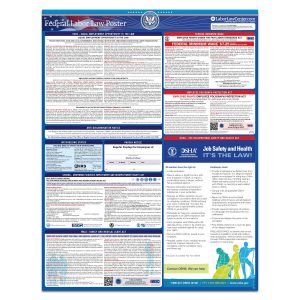IMPORTANCE OF MAINTAINING COMPLIANCE WITH LABOR LAWS
As federal, state and local municipalities issue new laws and update existing ones, businesses must be kept informed of these laws and changes, how they affect them and their employees and how to ensure that their business complies to the letter of the law. The Department of Labor oversees and enforces more than 180 federal labor laws that affect the workplace. Many of these laws impact specific types of businesses, yet there are core laws that affect every employer. As an example, three of the core labor laws that affect the majority of businesses today are:
- Occupational Health and Safety Act (OSHA) – regulates health and safety conditions in private sector industries, thereby ensuring the workplace does not pose any serious hazards.
- Family Medical and Leave Act – requires employers with more than 50 employees to give workers up to 12 weeks of unpaid, job-protected leave for the birth or adoption of a child or for the serious illness of the employee or a spouse, child or parent.
- Fair Labor Standards Act – sets standards for wages and overtime pay and guarantees federal minimum wage and overtime pay.
The importance of maintaining compliance with labor laws is actually quite simple. Compliance is a means of protection for both the employee and the employer. The laws spell out the requirements and compliance ensures legal protection for those who abide by the law. For those who do not abide by the requirements of the law, legal provision may not be available in the case of lawsuits.
Compliance is achieved in many ways. Some compliance requires that situations be documented and incidents files with the government. An example is with OSHA reporting of accidents, injuries, illnesses or deaths caused by unsafe work conditions. In this case, First Report of Injury Forms must be completed and reports filed with the government.
Another example of compliance involves several state laws around paid sick leave or pregnancy leave where an employer must notify every new hire of the law in writing upon their start of employment.
A more common means of compliance is the labor law posters which are required at the federal and state level and some local levels. Posters summarize important details of the law and are required to be displayed at highly visible locations within the workplace, thereby ensuring that every employee has access to the information.
It is important that employers keep current with new laws and changes to existing laws. One might think that these laws do not change much or that new laws are not issued all that frequently, but that is definitely not the case. Laws are continually changing (such as minimum wage laws) and being added (such as paid sick leave laws and ban-the-box laws). The best way to keep current on all of the laws is to regularly monitor the federal Department of Labor (DOL) website as well as state DOL and city/county government websites. Most of these sites do an excellent job of discussing upcoming new laws and changes. Laws such as paid sick leave and minimum wage changes have a significant impact to businesses and requires careful planning to ensure that when the law takes effect the employer is ready to implement and can do so in an effective way. Employers never want to be caught unaware of new laws and changes as non-compliance can carry fines and penalties and in the case of government contractors, could even impact a business’ ability to win new contracts.
Bookmark the permalink

 Cart (0)
Cart (0)




